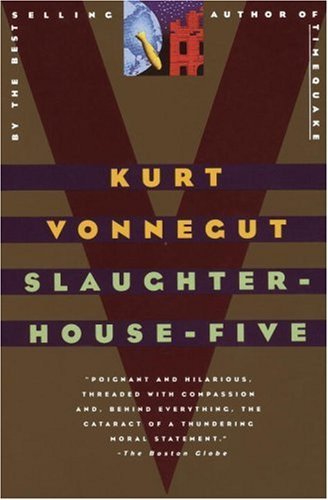
Carmyn, Pam, Brian, Andrea, Larry, and Kristine met at Pam's on June 25th for our discussion on Slaughterhouse Five by Kurt Vonnegut
Each year we usually try to read at least one of those books that many consider to be part of our literary consciousness--a classic. There are so many, and even as an English teacher, I've not read them all. It turned out THIS was a title many of us hadn't read.
The general response was mixed. I actually liked the book, though it was a bit "messed up" and demanded discussion. With the internet so handily available I immediately googled the book and read the Wikipedia page, some of the Spark Notes, and several articles about the book, including some biography pages of Kurt Vonnegut.
This was not my first exposure to Vonnegut, however. In college I read Cat's Cradle, a book which also inspired a "what the heck" as I read it. Both books have an irreverence for Christianity that might be part of why his work is so frequently getting "challenged" in schools and libraries. I, also, use the short story "Harrison Bergeron" with students.
One question that was posed at book club was "Why? Why is this book considered such a classic?"
We speculated and here are a few ideas that emerged. Slaughterhouse Five is a story within a story. It's a great example of post-modern writing. Part of the lesson that Billy Pilgrim learns from the Tralfamadorians (the aliens who abduct him and put him on display in a zoo on their planet) is demonstrated in the time travel. The structure of the novel seems to be doing something unusual and while that alone might be noteworthy, the subject matter is. We didn't completely solve this question.
It's an anti-war story told at a time when the world was rather fed up with the Vietnam War. It's a story about the bombing of Dresden and one man's response to that event. Vonnegut, himself, actually survived the bombing of Dresden and perhaps this is his way of dealing with that event.
This novel reminded me of Hemingway's short story "A Soldier's Home" which is in our American Literature textbook. In that story, Harold Krebs returns home from war and is clearly suffering from a post-traumatic stress disorder. Billy Pilgrim in Slaughterhouse Five is much the same. His apathy, "so it goes," to everything in his life from his wife, to his kids, to his job, is indicative of the sort of man he's become post-war. He only seems to get excited by Kilgore Trout, an unknown, unusual author whose work he's introduced to in the mental institution following the war. Kilgore Trout is a terrific character, the alien bit was great fun. And the war segments which actually do seem to appear in a chronological order were intriguing. Those bits made me want to know more about what happened in Dresden. They reminded me that I've read another version of that event in Jonathan Safron Foer's book Extremely Loud and Incredibly Close.
Slaughterhouse Five was worth the read, I'd recommend it even though some book club members would not. We had a rousing discussion, so there's always that!
No comments:
Post a Comment